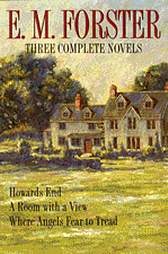Search -
Three Complete Novels: Howards End / A Room with a View / Where Angels Fear to Tread
Three Complete Novels Howards End / A Room with a View / Where Angels Fear to Tread
Author:
Howard's End — The self-interested disregard of a dying woman's bequest, an impulsive girl's attempt to help an impoverished clerk, and the marriage between an idealist and a materialist -- all intersect at a Hertfordshire estate called Howards End. The fate of this beloved country home symbolizes the future of Englan... more »
Author:
Howard's End — The self-interested disregard of a dying woman's bequest, an impulsive girl's attempt to help an impoverished clerk, and the marriage between an idealist and a materialist -- all intersect at a Hertfordshire estate called Howards End. The fate of this beloved country home symbolizes the future of Englan... more »
ISBN-13: 9780517091265
ISBN-10: 0517091267
Publication Date: 2/20/1993
Pages: 503
Rating: 7
ISBN-10: 0517091267
Publication Date: 2/20/1993
Pages: 503
Rating: 7
4 stars, based on 7 ratings
Genres:
- Literature & Fiction >> British & Irish >> Classics >> Forster, E.M.
- Literature & Fiction >> Anthologies & Literary Collections




